What if everything that we know about the world is about to change? What if humanity is on the edge of a transformation unlike anything anyone has ever seen before? What if the way we work, connect and live was about to be turned upside down?
Welcome to the world of “Homo Deus,” where Yuval Noah Harari explores how our future will look like, and whether we should look ahead with hope or terror. While many things you’re about to read will sound impossible, Professor Harari will argue many of them are inevitable, based on where technology is already heading.
Artificial intelligence is no longer the stuff of science fiction. Tools like ChatGPT are already changing the way many people work, and other cutting-edge AI technologies can create hyperrealistic images for any idea you give it. It’s mind-blowing, and believe it or not, this is just the beginning.
Religion, a cornerstone of human civilization for at least thousands of years, is under heavier pressure than ever. Where is it heading? How will faith adapt in a world overrun by technology? What is the religion of the future going to look like? These are more fascinating topics discussed by Harari in this book.
Have you ever heard of black swan theory? It’s the idea that we often underestimate the impact of unexpected events. It applies here too. For example, the internet was seen as some weird little invention that only a few geeks cared about. But the internet turned out to be a ‘black swan’ that transformed our world completely. This book “Homo Deus” will explore other possible future black swans, like genetic engineering.
Who is Yuval Noah Harari?
Yuval Noah Harari is a historian, professor, and bestselling author of three popular science books. His most famous one is “Sapiens: A Brief History of Humankind”—read our summary! Harari is know for his ability to combine facts of history with thought-provoking philosophical ideas, while keeping his writing fast and engaging.
🧬 1. From Death to Immortality: Our journey from starvation and disease to unprecedented power
As a member of the human species, do you ever stop and think about how far we’ve come? Just a few centuries ago, a bad season for crops would bring disaster and death. Today, we worry more about overeating than starvation. The first parts of “Homo Deus” dive deep into this astonishing transformation. The big shift from humans struggling to survive against constant threats, to a new era where we wield god-like power over other animals.
3 major problems were the cause of past human suffering, according to Harari:
- Starvation. In the past, hunger was a very real deadly threat, and it could strike any year. Too little water for your potatoes or some bandits stole your sheep herd? Then your family might die. In one year alone, 1694, a single famine wiped out 15% of France’s population. And that’s just one example from many shared in this book. Today this problem is essentially solved in developed countries, where in 2010 more people died from obesity than malnutrition (3 million vs 1 million deaths).
- Disease. It used to be a merciless killer, before the times of antibiotics, vaccines, hygiene, etc. Major epidemics like the Black Death in 1330 eliminated 1/4 of Europe’s population. Before, about 1/3 of children never made it to adulthood, while today child mortality in developed countries is under 1%.
- Violence. Contrary to popular perceptions, violence is trending down too. History was filled with wars between major powers, but today (after World War 2) war has been limited to smaller-scale conflicts and terrorism. (Harari believes this change is thanks to atomic bombs and international trade.) Today, more people die from suicide every year than from war or crime.
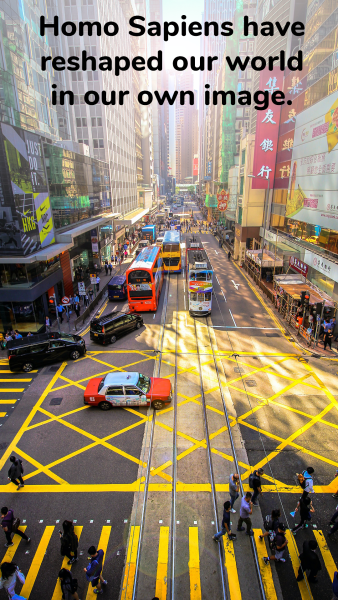
Today, the end is in sight. These 3 problems (starvation, disease, and violence) have not been solved, but because of progress made over the past few hundred years, for the first time ever we have hope they will be solved.
For this reason, Harari says the last 70,000 years of earth’s history should be called “The Anthropocene” which basically means “the age of humans.” We have gained unprecedented power, to reshape our destiny and our environment, according to our desires.
However, all this progress has come at large cost, especially to the environment and other animals. During our rise to power, we caused the extinction of 50% of large land mammals. Today, almost 90% of large land animals are either humans, or animals domesticated by humans. Widespread animal suffering is caused by industrial farming practices that ignore the the fact animals have needs that are psychological just like us.
Did you know there were other human species in the past, besides Homo Sapiens? For some reason, these other kinds of humans (like Neanderthals) soon disappeared when we arrived to their area of the world. This is obviously a bad look for our ancestors that lived tens of thousands of years ago. To find out a lot more details of human history, including the mystery of why we are the last humans left…
We’ve moved from a world plagued by starvation, disease, and violence to an era of unprecedented control and power over our destiny. The big question: what will we choose to do next?
🌟 2. The Rise of Humanism: The new secular religion of “following your heart” and where it will lead us
Ever wonder why you’re more likely to “follow your heart” than seek guidance from the night stars or religious scriptures? The next part of “Homo Deus” traces the history of religious beliefs, which have undergone a radical transformation.
From animism to theism. In the beginning, ancient humans probably practiced animism, seeing themselves as equals with nature, looking up to the stars for answers. The shift to believing in God or gods changed our focus from nature to scriptures. Harari calls it “the agricultural deal” because gods became intermediaries that we would appeal to for food, rain, territory, etc. Most theistic religions also provide justification for treating animals as inferior beings, there to serve human needs.
The rise of atheism and humanism. In the last 500 years, the Scientific Revolution changed everything. God became irrelevant to solving our biggest problems like starvation and disease. Humans increasingly felt themselves to be on their own, trying to create a heaven on earth by ourselves. Gradually, meaning shifted from God to the individual. For example, instead of priests educated in scriptures, we consult therapists who are trained to ask, “How do YOU feel about it?” This is the core of humanism.
In humanism, meaning shifts from a central God to being defined by each individual according to their inner heart.
A quick analysis: Yuval Noah Harari has a very atheistic perspective, yet the fact is that over 80% of the world’s population has some type of religious affiliation, even today. He argues that history is often driven by influential yet powerful minorities, just like communism was created by just a few intellectuals, but quickly took over half the world in the last century.
Taking humanism to it’s logical conclusions, Harari predicts 3 major goals for humanity:
- Immortality. Humans will try to end death. In the past, death was always tolerated, accepted as an inevitable part of life. In religions of all kinds, death was actually essential for their views of heaven, hell, or reincarnation. In the future, Harari believes humans will strive to end death. Getting old and dying will be seen as a series of technical problems that must be solved through better technology and more scientific research. Steps are already being taken in this direction, such as Google’s launch of the company Calico whose stated aim is to “solve death.”
- Happiness. Humans will try to ensure their endless satisfaction. Over time, society has made life easier for us, whether it’s the state providing social security programs that ensure basic needs, or the market providing products to make every part of life a little bit more convenient. In the future, Harari predicts we will EXPECT society to ensure our happiness.
(But this goal will be complicated by the fact that human happiness is very tricky. Today, the most developed countries actually tend to be less happy and have 25X the suicide rate of traditional societies with lower incomes. Why? Our happiness is often less about what we have, than our expectations. Classic wisdom from Buddha and Epicurus says it is our very pursuit of pleasant sensations that causes our dissatisfaction. Perhaps the answer is not getting more, but slowing down and enjoying what we have now.) - Divinity. Humans will become closer to gods. We will begin with slowly upgrading ourselves in small ways, but gradually we will change more and more of ourselves. One day, we will be an entirely different kind of species with different desires altogether, a species Harari calls “Homo Deus.” Three pathways by which this could happen: biological engineering, making ourselves cyborgs, and artificial intelligence.
The idea that humans could live to the age of 120, let alone forever, sounds impossible, like a dream from science fiction. But right now, researchers like David Sinclair at Harvard’s Center for Aging Research are working on this very goal. And he believes he’s on the right path to making it happen. In his book Lifespan, Professor David Sinclair defines aging as a disease. That’s right, a disease that will be curable, not an inevitable fact of life. More specifically, it’s a disease of information loss in our epigenome, which surrounds our DNA.
Right now, Sinclair says a few practices have shown strong promise in boosting our longevity. Such as: restriction of calories or fasting, exposure to cold temperatures, and regular strenuous exercise. What all these have in common is they expose our body to “hormesis” which is a beneficial, but not damaging, level of stress, that “activates our longevity genes.”
Humanism has shifted the gaze of humanity. For important answers, in prehistoric times we looked to nature and the stars, in olden times we looked to scriptures and authorities, but today we look inside and “follow our heart.” This shift will lead humanity to a new agenda: immortality, happiness, and divinity.
🔬 3. The Fatal Flaw of Humanism: How science undermines belief in human uniqueness
Does anything really make humans unique, setting us apart from every other creature under the sun? This is a fundamental question that strikes at the heart of humanism.
Harari explores 3 answers to this big question:
a) The Individual Soul
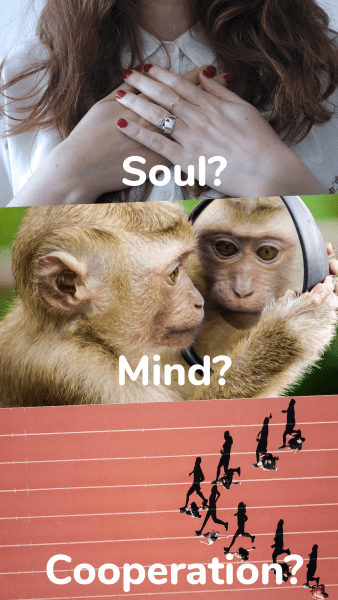
Most folks have this deep-seated belief that there’s a unique essence to each of us, something that speaks of free will, maybe even a soul.
But here’s the problem: science doesn’t exactly back this up. It says that everything seems to be either “deterministic or random”. That means it’s either a sequence of chemical reactions or just a bunch of subatomic particles behaving chaotically. No room for unique, soulful, human touches here, just bouncing atoms and blind energies.
Ever felt super sure you made a free choice? Well, science suggests it could all be an illusion. Take this study from Hassadah University: apparently, deep-seated feelings like acute depression can often be switched off with a tiny electrical implant.
Then there’s evolution—why is it so controversial? Did you know that not too long ago, around 40% of Americans said they don’t accept the idea of evolution? Instead believing that we, humans, were specially crafted by a Creator in our current form less than 10,000 years ago. Evolution, on the other hand, says humans are not uniquely made in the image of God, but part of a long gradual chain of random development, just like every other animal. Harari says that some might “ditch science before ditching their souls.” Notice that nobody really argues about teaching Einstein’s theory of relativity in schools, right?
Harari calls this chapter “The Time Bomb in the Laboratory,” meaning that our cherished notion of the soul might have already disappeared, but most of us haven’t noticed yet. The psychologist Jordan Peterson makes a similar point from another perspective. In his book Maps of Meaning, Peterson talks about how so many of our core values are deeply connected to beliefs in individual souls and a higher power. Many of the thought leaders, intellectuals in universities, don’t believe in these anymore, and most people in developed countries are moving in that direction too.
Well, what’s the problem with that? After all, many popular atheist writers belittle religion as nothing more than childish fairy tales. But Peterson argues these age-old myths, rituals and images contain a deep treasure of implicit wisdom that can guide our lives. And we may not yet have the ability to grasp the value of that wisdom using rational, explicit language. He writes, “The modern and verbally-sophisticated individual is therefore always in danger of sawing off the branch on which he or she sits.”
Read more in our summary of Maps of Meaning by Jordan Peterson
b) The Mind or Consciousness
The next possible source of human uniqueness is our mind or consciousness, that flow of subjective experience. According to the scientific view, the mind simply seems redundant. Why does it need to exist at all? Why can’t humans function blindly as machines according to their genes and natural laws? If Harari’s argument about no free will is correct, then our conscious experience of the world should be totally useless for evolutionary survival.
Yet it’s difficult to quickly discard our subjective experience as being important, because so much of our morals and politics are built upon it. For example, how else can we argue that torture or rape are wrong, unless we talk about inner subjective experiences?
c) The Power of Mass Cooperation
Humans, and only humans, have the ability to cooperate in flexible ways on a massive scale. Other animals can cooperate with a small herd in limited ways (like wolves) or in a very rigidly defined way (like bees). But only humans can collaborate, innovate, and create with millions of strangers.
This cooperation is not only thanks to our intelligence, but our ability to create shared stories or fictions. For example, money is a shared fiction. On one hand, it is really just a piece of paper, but because we all agree that piece of paper has value, then it does and it becomes an incredibly useful tool. In history, many objects have been used as money, including seashells, grains, and now computer bits. The important thing was never the object, but our shared agreement about it. Harari calls money an “intersubjective entity”—that means the value exists in our shared imaginations. Other examples of useful “shared fictions” include: corporations, nations, and gods.
Shared fictions, combined with the invention of writing, allowed massive human societies to be organized. Just look at Ancient Egypt, where a Pharaoh was worshipped as a god-on-earth. With millions buying into that story, it allowed the construction of massive pyramids and intricate canal systems. An idea shared in the imaginations of millions of Egyptians, could then create a really extraordinary power in the world, even to reshape river systems and avoid drought.
What makes humans unique, that meaning should rest in us? A core question that strikes at the heart of humanism. Science cannot support the existence individual souls, consciousness remains a perplexing mystery, yet it is undeniable humans have a unique ability to cooperate.
💸 4. The Gospel of Growth: How the faith of modern people is trust in the economy
Have you ever suspected, deep down, there’s a new religion that we are all unknowingly worshipping? Enter the religion of now—worldwide faith in economic growth. In this next bit, we’ll dive into how this modern creed shapes our norms, values, and the very fabric of society.
But isn’t science the new replacement for religion? Not exactly. Science tells us how the world functions, but it can’t tell us what we should do with that knowledge. It’s like, if we were to build a massive dam, science can empower the engineers to do it. But the ethical decisions? Like balancing the benefits for humans vs. the damages to the ecosystem? That’s the domain of religion.
Harari redefines religion in a practical way, as anything that gives “superhuman legitimacy” to our social structures.
In essence, a religion validates a social structure. This helps ensure social stability—at least, for as long as the majority believe in that religion. This is clearly different than how most of us currently think of religion—as a belief in heavenly beings and spiritual dimensions.
Slowly, religion has shifted from a foundation in God to natural laws:
- In a society rooted in the Bible, parents tell their kids to follow the laws because God gave Moses the 10 Commandments. In ancient Babylon, people followed the Code of Hammurabi because the god Marduk gave direct authority to the King.
- Communist societies justified themselves by saying they were based in Karl Marx’s discovery of universal laws about class and economics. Even the Nazis had a twisted justification based on universal laws of natural selection.
- Today modern liberals, who feel very passionately about human rights, would never say it’s a human invention. They would feel deeply that human rights are timeless, universal—true for all people and in all times. In other words, there was never a time when slavery was perfectly good.
Now, let’s talk about the modern faith in economic growth, aided by science. All across the world today, growth and development has been sold as the solution to all our problems. Political leaders get elected by promising the most economic growth, whether we’re looking at Narendra Modi in India, Recep Tayyip Erdoğan in Turkey, or Shinzo Abe in Japan.
Hundreds of years ago, rulers wouldn’t think to promise growth. The pie of resources was felt to be finite, and it was about dividing it up. (Or maybe conquering your neighbour.) Now? We’re trusting in a miracle pie that just keeps expanding, so that everyone can eat a bigger slice.
Like everything, this emphasis on economic growth has pros and cons:
- Pros: Harari gives credit where credit is due. Free-market capitalism, for all its intellectual critics, has achieved wonders. Nothing else in history has reduced so many major sources of human suffering—famine, plague, poverty, violence have all dramatically declined. Despite the daily doom and gloom new headlines, global data paints a pretty positive picture. (If you need stats to back this up, the book “Factfulness” by Hans Rosling is a good read.)
- Cons: But there are costs. We’ve seen weakened family bonds, the looming shadow of environmental collapse, and a societal hunger for deeper meaning. But here’s the funny twist, growth also promises to provide the solutions here – be it through therapy for our emotional distress or technology like carbon-sucking machines to avoid the Apocalypse.
Harari defines religion as what grants “superhuman legitimacy” to social structures. This would include the 10 Commandments, Communist Manifesto, and Human Rights Declarations. They are believed to come from divine or universal laws. Today’s dominant faith? Economic growth, which promises to eventually fix all our ills.
🤖 5. Techno-Religions of Tomorrow: The future of humanism—how technology will reshape our core beliefs
Get ready for things to get really wild. Imagine a future where technology doesn’t just serve us, but fundamentally changes us. Where will humanism fit into that picture?
Harari identifies three primary branches of humanism:
- Liberal humanism: This branch believes that granting individual maximum liberty and freedoms is the best path to peace and prosperity. Even today’s conservatives in developed, Western countries mostly back this old definition of liberalism. (Though the word “liberal” is now often used to mean “left wing.”)
- Socialist humanism: Socialist movements and communist revolutions are part of humanism, rooted in human feelings. But they shift the emphasis to collective over individual wellbeing—the feelings of the child working in a factory matter, too. They diagnose the cause of bad feelings to often be the social system, seen through a lens of class, privilege, and exploitation. Self-exploration is discouraged, and more trust is places in strong institutions like the trade union or central political party.
- Evolutionary humanism: By this view some humans, cultures, and nations, are simply superior to others. Famous examples include eugenics and Nazism. Not all human experiences are equally valuable—like the Taj Mahal is better than a straw hut. This being the case, they often believe we shouldn’t interfere with natural selection, even extending to war.
In the 20th century, liberal humanism appeared to be almost defeated. Remember the Nazis took over much of Europe and then Communism swept the world. But the collapse of the Soviet Union caused liberalism to rise again, like a phoenix from the ashes. Today almost all major countries in the world are some type of free-market democracy, with some additions from socialism like safety nets and healthcare. Even China, while theoretically communist, has steadily liberalized its economy.
That brings us to the all-important question: What’s next?
Historically, technology has often been a powerful catalyst for new belief systems. For instance, Harari argues that without industrialization, there would be no foundation for communism. He calls that the first “techno-religion,” a belief system born out of new human powers for centralized data processing. That suggests we can predict future belief systems by looking for hints in rising technologies, to understand what “techno-religions” of the future may look like.
This brings us to “techno-humanism,” a philosophy that seeks to enhance and upgrade humans through technology. All in pursuit of immortality, happiness, and godlike power. Some technologies relevant to this include:
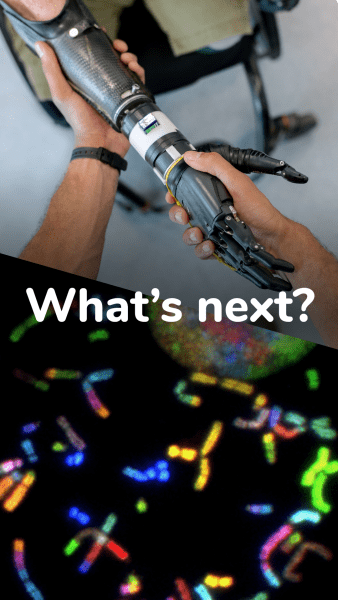
- Biotechnologies and genetic engineering. Giving us the ability to edit genes to eliminate disease. But why would we stop there? We could also alter genes to give us desires attributes, characteristics and abilities. Perhaps just like plastic surgery began as a way of fixing deformities and injuries, but was soon used to enhance the appearance of regular people (with enough cash).
- Brain-Computer Interfaces. Being able to enhance our thinking with a direct connection to a supercomputer or artificial intelligence would give some people such an incredible advantage. Virtual reality and augmented reality could reshape our direct perception of the world.
- Mood-altering treatments. Already being done on a smaller level, when people take drugs for depression. Eventually the treatments will become far more effective, with few or no side effects.
With many of these future predictions, a funny contradiction arises. Humanism begins with us listening to our inner voice, then using science to fulfill our desires. But when technology becomes powerful enough to change our very desires, like transforming our sadness into happiness, then are we not disrupting that inner voice that gave meaning and authority to humanism in the first place?
Another major problem is that we don’t know where “techno-humanism” may take us, once we begin upgrading our mind with technologies. Human consciousness can only see a very narrow spectrum of reality, and what else is really out there is clouded in uncertainty. Just as bats are able to use echolocation, a type of consciousness we can’t access, our advancements may propel us into uncharted territory where what it means to be “human” no longer even applies to us. It’s like we’re in a tiny boat, floating across a massive “ocean of consciousness,” right now totally blind to what exists beyond our limited horizon.
In the past hundred years, liberal humanism has triumphed over socialist humanism and evolutionary humanism. In the future, new “techno-religions” may arise caused by new technologies like genetic engineering or artificial intelligence, that may change the foundation of our very human-ness.
🌐 6. Dataism: The new religion of the information age
100 years ago, figures like Lenin, Mao, and Hitler stood towering and terrifying, with grand visions to shape the future of their nations. Fast forward to today, and our politicians are scattered and dizzy, trying to keep up with the relentless pace of change of digital technology.
Last week, we were all talking about the rise of decentralized digital currencies. This week, we’re grappling with the implications of artificial intelligence. Next week, who knows what’s next?
The internet has caused an enormous data revolution, undermining national borders as people exchange data directly with each other across the world. Sharing our data to be used in collective algorithms has already proven extremely useful to us—whether it’s Youtube knowing what we want to watch next, Amazon telling us what book we’ll love next, or Uber guiding our ride more efficiently.
This will lead to a new religion of “Dataism” where the ultimate value is freedom of information, says Yuval Noah Harari. In the future, people will feel meaning from becoming part of the data flow, something larger than themselves.
On a smaller level, this has already happened. A person goes on vacation to see a landmark, they don’t look at it asking themselves “how do I feel?”, but take a photo and immediately upload it to their social media, checking how their larger network feels about it. This trend will likely grow stronger and stronger.
People will be more willing to sacrifice their privacy, autonomy and individuality for the immense benefits that Big Data can provide, as well as a sense of meaning.
Over time, we will likely trust algorithms to make more of our decisions for us—like important medical decisions, who to date and marry, what major to choose in college.
Highly intelligent algorithms will actually become better than us making most decisions. Because they’ll be able to combine our data with the data of countless others, and accurately predict our future satisfaction with a decision, often understanding our preferences on a deeper level than we do.
As people increasingly feed their data into centralized networks, we inch closer to the Singularity—a point in time where artificial intelligence surpasses human intelligence. And if then AI learns how to improve itself, that would cause unforeseeable changes to civilization.
That may sound like a future straight out of George Orwell’s “1984”—a famous science fiction book where centralized power has unimaginable control over people’s lives. Yet, unlike the grim world Orwell painted, many of us are willingly walking into this future, eyes wide open, hypnotized by the promise of convenience and a better life.
Dataism will be a new ‘religion’ with the ultimate value being freedom of information. Many will surrender their privacy and autonomy for the benefits given by highly intelligent algorithms. Plus, the sense of meaning from being part of the larger collective data flow.
- Try out a new AI tool. If you haven’t already, then sign up for a free OpenAI account. Find out for yourself what all the excitement is about. Ask ChatGPT a few questions or ask it to give you a very specific recipe. Also Try DALL-E 2, their tool for generating images.
- Do a 1-day technology reset. Consider dedicating one day per week to step away from technology and hide your phone. This will lead to a greater awareness of how strongly technology already affects our lives, as well as appreciation of the benefits it provides.
- Go for a forest walk. The perfect way to refresh ourselves after all this talk about artificial new technologies. Connect with nature, realizing that while humans are unique, we’re just a part of this vast web of life.

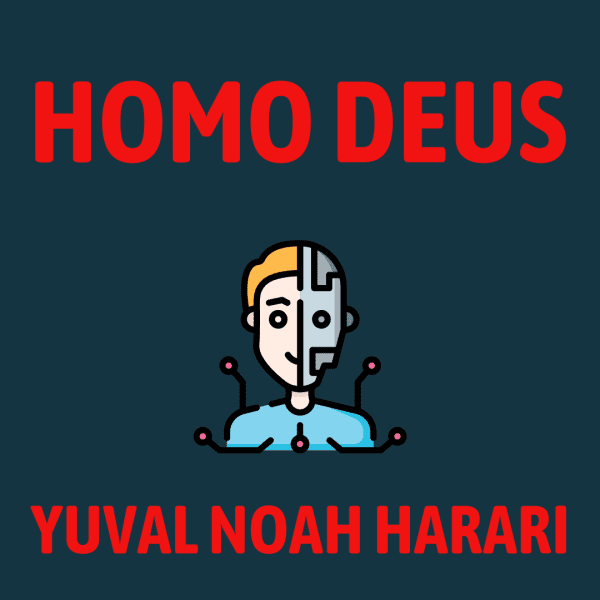
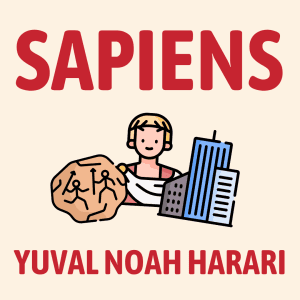
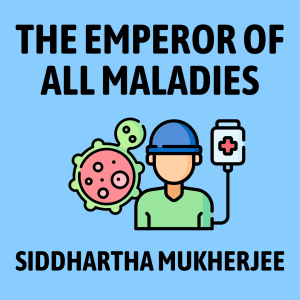

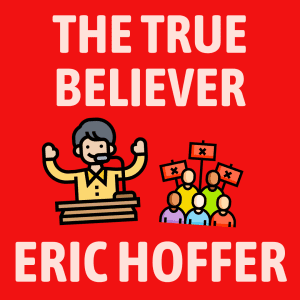

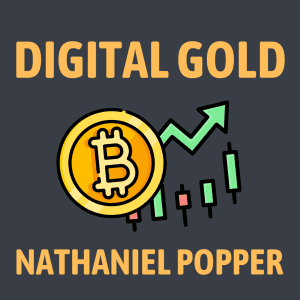
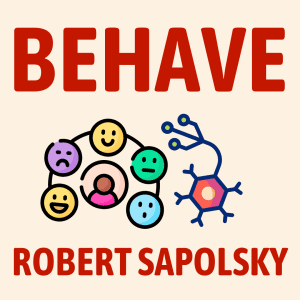
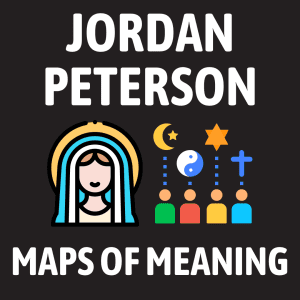
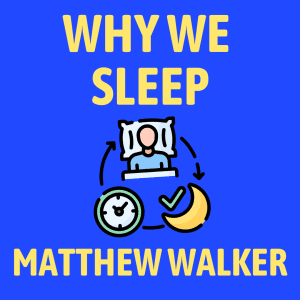
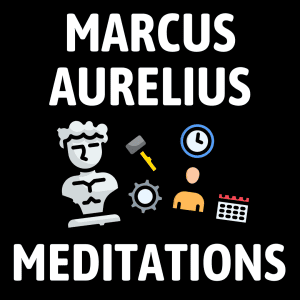




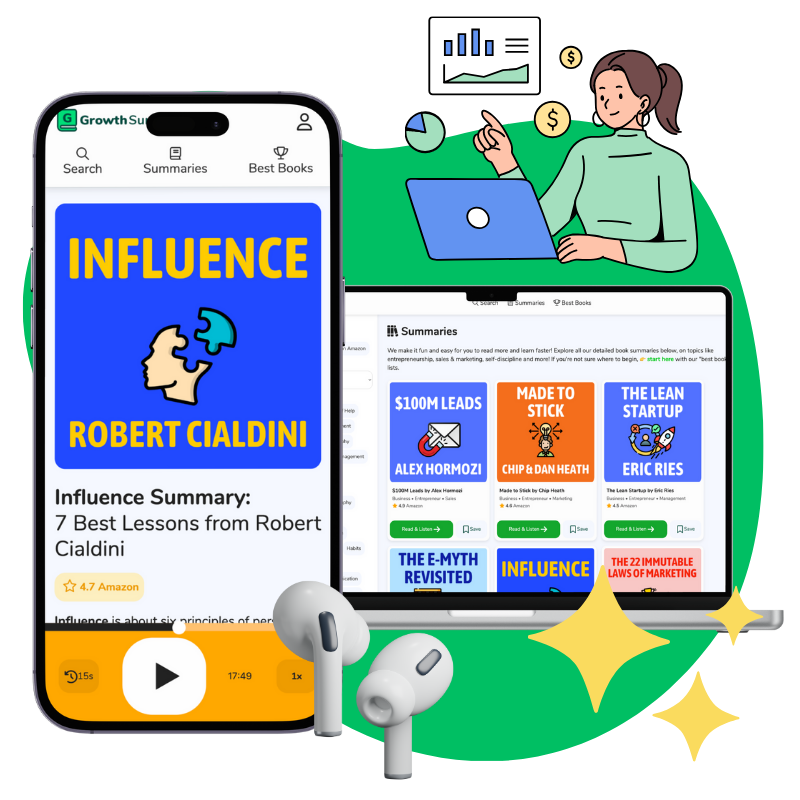
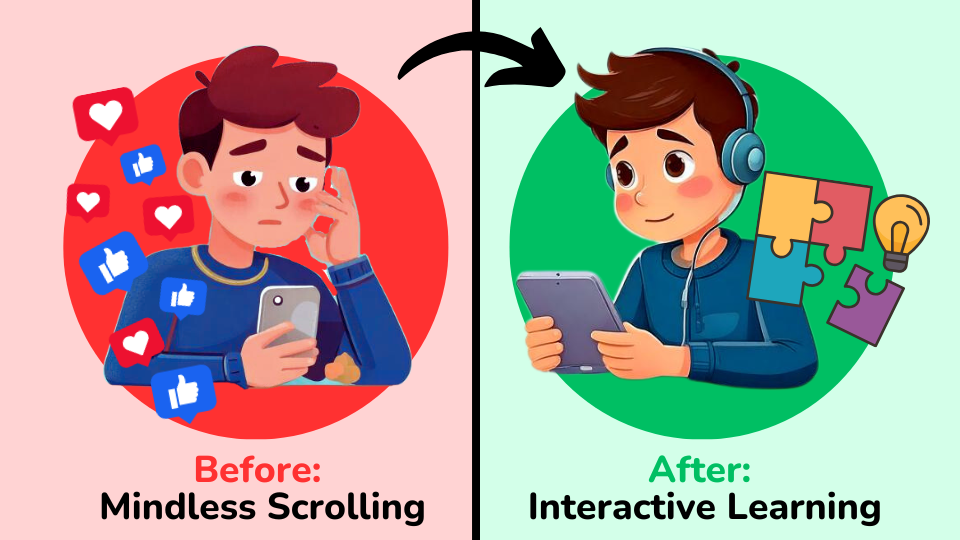








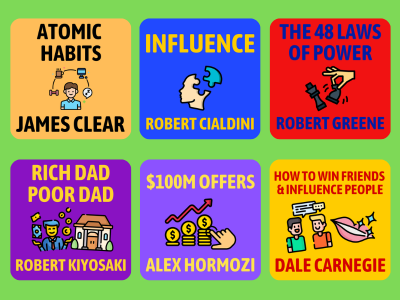
Community Notes